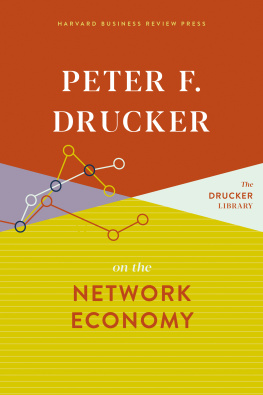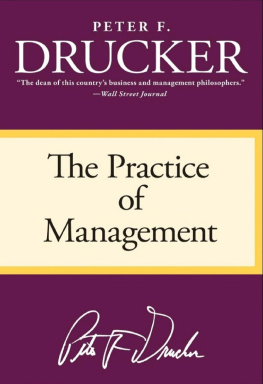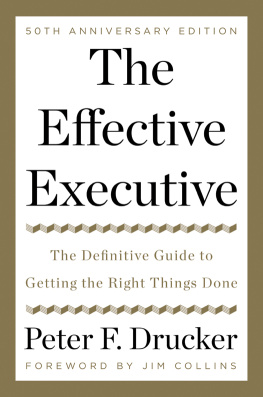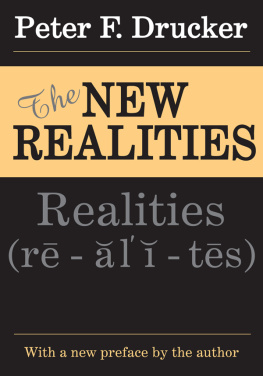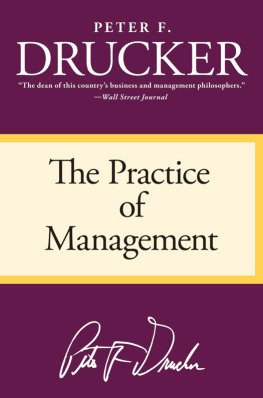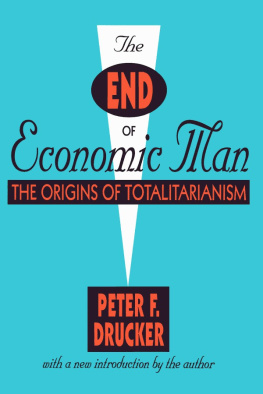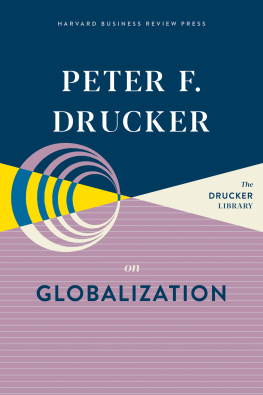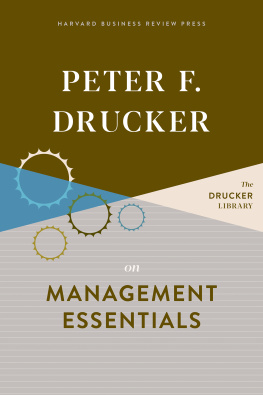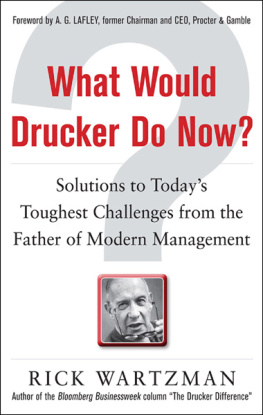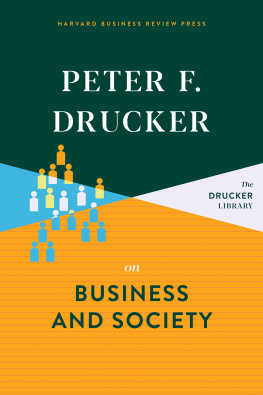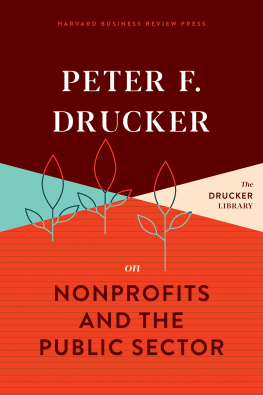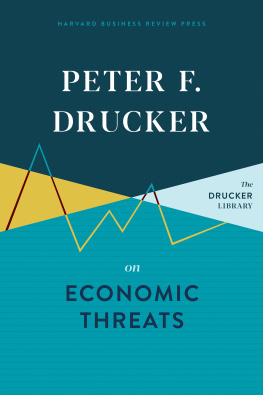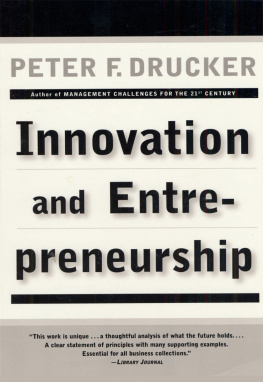Peter F. Drucker - Peter F. Drucker on the Network Economy
Here you can read online Peter F. Drucker - Peter F. Drucker on the Network Economy full text of the book (entire story) in english for free. Download pdf and epub, get meaning, cover and reviews about this ebook. year: 2020, publisher: Harvard Business Review Press, genre: Science. Description of the work, (preface) as well as reviews are available. Best literature library LitArk.com created for fans of good reading and offers a wide selection of genres:
Romance novel
Science fiction
Adventure
Detective
Science
History
Home and family
Prose
Art
Politics
Computer
Non-fiction
Religion
Business
Children
Humor
Choose a favorite category and find really read worthwhile books. Enjoy immersion in the world of imagination, feel the emotions of the characters or learn something new for yourself, make an fascinating discovery.
- Book:Peter F. Drucker on the Network Economy
- Author:
- Publisher:Harvard Business Review Press
- Genre:
- Year:2020
- Rating:5 / 5
- Favourites:Add to favourites
- Your mark:
- 100
- 1
- 2
- 3
- 4
- 5
Peter F. Drucker on the Network Economy: summary, description and annotation
We offer to read an annotation, description, summary or preface (depends on what the author of the book "Peter F. Drucker on the Network Economy" wrote himself). If you haven't found the necessary information about the book — write in the comments, we will try to find it.
Peter F. Drucker on the Network Economy — read online for free the complete book (whole text) full work
Below is the text of the book, divided by pages. System saving the place of the last page read, allows you to conveniently read the book "Peter F. Drucker on the Network Economy" online for free, without having to search again every time where you left off. Put a bookmark, and you can go to the page where you finished reading at any time.
Font size:
Interval:
Bookmark:

The Drucker Library
Peter F. Drucker on Technology
Peter F. Drucker on Business and Society
Peter F. Drucker on Management Essentials
Peter F. Drucker on Nonprofits and the Public Sector
Peter F. Drucker on Economic Threats
Peter F. Drucker on Globalization
Peter F. Drucker on Practical Leadership
Peter F. Drucker on the Network Economy

HBR Press Quantity Sales Discounts
Harvard Business Review Press titles are available at significant quantity discounts when purchased in bulk for client gifts, sales promotions, and premiums. Special editions, including books with corporate logos, customized covers, and letters from the company or CEO printed in the front matter, as well as excerpts of existing books, can also be created in large quantities for special needs.
For details and discount information for both print and ebook formats, contact booksales@harvardbusiness.org, tel. 800-988-0886, or www.hbr.org/bulksales.
Copyright 2020 Harvard Business School Publishing Corporation
All rights reserved
No part of this publication may be reproduced, stored in or introduced into a retrieval system, or transmitted, in any form, or by any means (electronic, mechanical, photocopying, recording, or otherwise), without the prior permission of the publisher. Requests for permission should be directed to permissions@harvardbusiness.org, or mailed to Permissions, Harvard Business School Publishing, 60 Harvard Way, Boston, Massachusetts 02163.
ISBN: 978-1-63369-955-7
eISBN: 978-1-63369-956-4
This book is one of several volumes in the Drucker Library published by Harvard Business Review Press.
The essays in this volume were written between 1992 and 1995. When Peter Drucker collected them for this volume in 1995, he resisted, as he explained in an earlier volume of essays, the temptation to rewrite, contending that it was only fair to let the reader decide how well the authors opinions, prejudices, and predictions have stood the test of time.
Some fifty years later, modern readers may find Druckers language at times dated or inappropriate and some of his arguments controversial or utterly wrongheaded. But as editors we too have chosen to resist the urge to tamper with the original texts, for we did not feel confident we could always tell the difference between updating and censorship. Further, we believe that one of the many delights of these essays for current readers, who enjoy the advantage of complete hindsight extending over the entire period in which Drucker made predictions, is in judging how remarkably prescient and applicable so much of this thinking remains today.
All the pieces in this booktwo interviews, one at the beginning and one at the end, and the twenty-five chapters in between, have one common theme, despite their apparent diversity. They all deal with changes that have already irreversibly happened. They therefore deal with changes on which executives canindeed musttake action. None of the pieces in this book attempt to predict the future. All deal with what executives can dohave to doto make the future.
It is not so very difficult to predict the future. It is only pointless. Many futurologists have high batting averagesthe way they measure themselves and are commonly measured. They do a good job of foretelling some things. But what are always far more important are fundamental changes that happened though no one predicted them or could possibly have predicted them. Looking back ten years ago today, no one in 1985 predictedor could have predicted that the establishment of the European Economic Community would not release explosive economic growth in Europe but would, on the contrary, usher in a decade of economic stagnation and petty bickering. As a result, the unified Europe of 1995 is actually weaker in the world economy than was the fractured Europe of 1985. No one, ten years ago, predictedor could have predictedthe explosive economic growth of mainland China, a growth that came despite rather than because of its government policies. No one predicted the emergence of the 55 million overseas Chinese as the new economic superpower. No one ten years ago could have predicted that the biggest impact of the Information Revolution on business would be a radical rethinking and restructuring of the oldest information systemand one that apparently was ossified in every joint and tissuethe accounting model of the bean counters.
But equally important: one cannot make decisions for the future. Decisions are commitments to action. And actions are always in the present, and in the present only. But actions in the present are also the one and only way to make the future. Executives are paid to executethat is, to take effective action. That they can only do in contemplation of the present, and by exploiting the changes that have already happened.
This book starts out with the executives job, that is, with management. What has already happened in the world of the executive that puts into questionor perhaps even makes obsoletethe assumptions, rules, and practices that have worked these last forty years and that therefore have automatically been taken for granted? The book then proceeds to look at the implications of one particular fundamental change in management, economy, and society: the emergence of information as the executives key resource and as the organizations skeleton. The premise of this part of the book is the old adage that either you are the tools master or you are its servant. What do executives have to learn to be masters of the new tool? Then this book moves out of the executives job and organization into markets and into a world economy in which there are new power centers, new growth markets, new growth industries. In its last section the book analyzes the changes in society and governmentthe biggest changes, perhaps, in this century of social transformation, in which government has been both a great success and the ultimate failure.
Only thirtyperhaps even only twenty-fiveyears ago it was often said that while there were a great many more managers and executives than there had been in the 1920s (let alone before World War I), most of them were doing pretty much what their predecessors had done and in pretty much the same way. No one would say that anymore for todays managers and executives. But if there is one thing that is certain today, it is that tomorrows managers and executives will do things that are even more different from what todays managers and executives do. And they will do them quite differently. To enable todays executives to be ahead of this different tomorrowindeed to make it their tomorrowis the aim of the book.
Peter F. Drucker
Claremont, California
May 1995
From the very beginning, in 1991, every piece in this volume was written with this book in mind. But every single one was also prepublished, intentionally so. It is the reaction of readersand especially of friends all over the world, former students, present and former clientsthat ultimately determines whether a piece is worthy of being included in the final book. Prepublication is, so to speak, my market test.
For the most part, the pieces chosen appear as chapters in this book without any change other than perhaps a new title or a restoration of cuts that had to be made to fit a piece into a magazine or newspaper. But three long pieces in this book are substantially different from the version in which they were published originally they are much longer. was written especially for this book.
Font size:
Interval:
Bookmark:
Similar books «Peter F. Drucker on the Network Economy»
Look at similar books to Peter F. Drucker on the Network Economy. We have selected literature similar in name and meaning in the hope of providing readers with more options to find new, interesting, not yet read works.
Discussion, reviews of the book Peter F. Drucker on the Network Economy and just readers' own opinions. Leave your comments, write what you think about the work, its meaning or the main characters. Specify what exactly you liked and what you didn't like, and why you think so.

